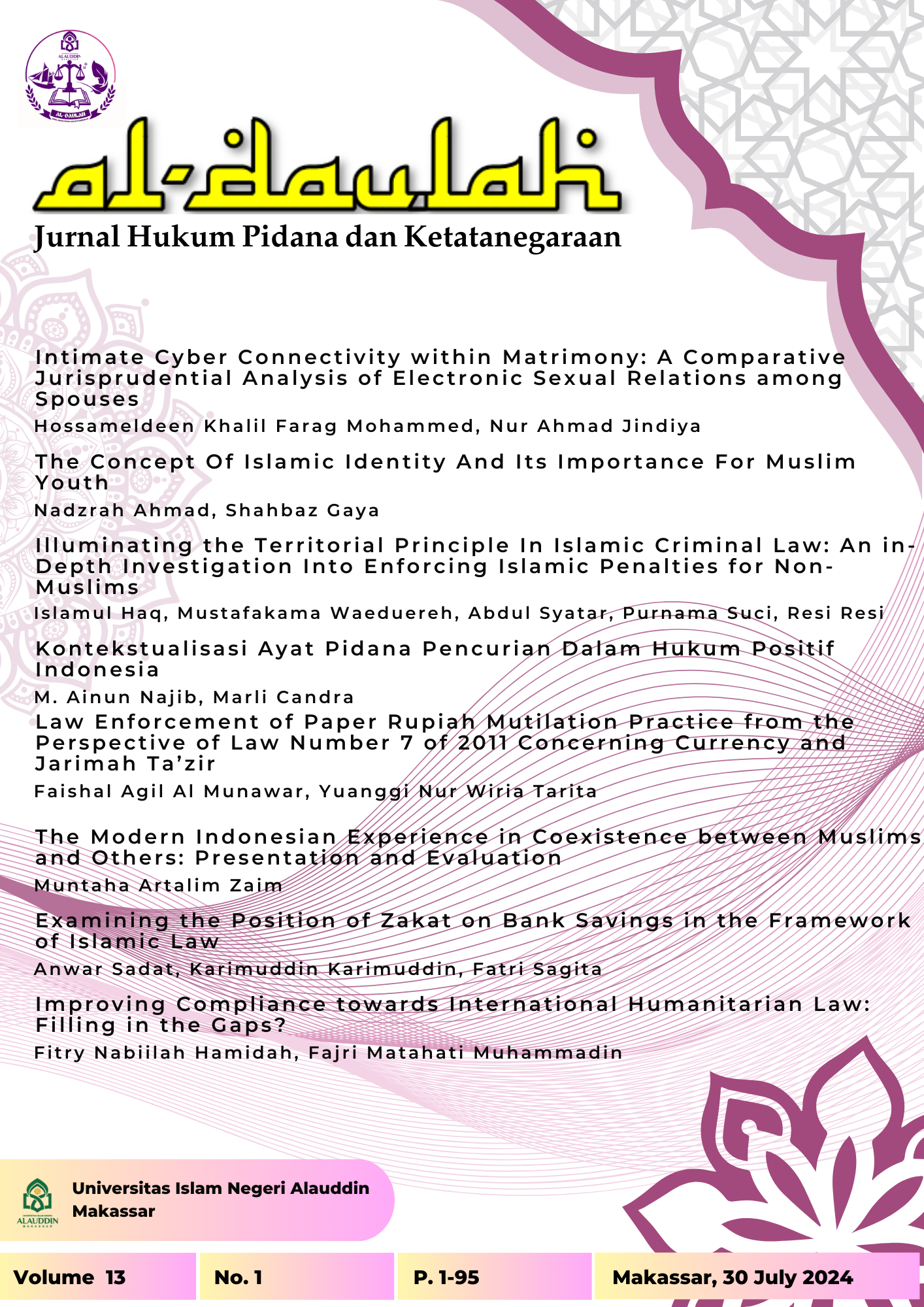Perspektif Al-Qur’an Tentang Posisi Manusia Dalam Memakmurkan Alam Raya
Abstrak
God's authority and control the universe of natural riches to humans and all other creatures with affection. Man was created as a servant of God and inheritors of God. As inheritors of God, he has the authority, potency, and the freedom to prosper nature of the universe that have been subjugated Allah. With the ability of mind, intelligence and vision science, humans are able to organize and preserve lives peacefully with other creatures. Humans as bearers of the message of God to inhabit the universe must be within the law and the rule of God and never against sunatullah which he set forth.
Referensi
Al-Asfahany, al-Raghib, Mufradat al-Fazh Alquran. Beirut: Dar al-Syariyah, 1412 H/1992 M.
Anis, Ibrahim. Al-Mu’jam al-Wasit. Mesir: Dar al-Ma’arif, 1392 H/1972 M.
Abd. Al-Baqi, Muhammad Fuad, al-Mu’jam al-Mufahras Li Alfazh al-Qur’an al-Karim.Beirut: Dar al-Fikr, 1987 M.
Al-Aqqad, Abbad Mahmud, al-Falsafah al-Quraniyyah. Kairo: Dar al-Hilal, t.th.
Ali, Othman. The Concept of Man in Islam, in the Writings of el-Ghazali. Kaira: Dar al- Ma’arif, 1960.
Al-Alma’iy, Zahir Ibn ‘Iwad, Dirasat fi Tafsir al-Mawdhu’iy Li Alquran. Riyad: T.p. 1985 M/1415 H.
Asy’arie, Musa, Manusia Pembentuk Kebudayaan dalam Alquran. Yogyakarta: LESFI, 1992.
Bakker, Dirk. Man in The Qur’an. Amsterdam: t.p., 1965.
Kementerian Agama RI., Alquran dan Terjemahnya. Jakarta: PT. Sinergi Pustaka
Indonesia, 2012.
Hamka. Tafsir al-Azhar. Jakarta: Pustaka Panjimas, 1988.
Hijary, Mahmud Muhammad. Tafsir al-Wadhib. Istiglal al-Kubro, 1289 H/1969 M.
Ibn. Katsir, Imam Abil Fida al-Hafizh. Tafsir Alquran al-‘Azhim. Dar al-Fikr, t.th. Jauhary, Thanthawi. Al-Jawahiru fi Tafsir Alquran Karim. Mesir: Mustafa al-Baby al-
Halaby wa Auladah, 1350 H.
Al-Maraghy, Ahmad Mustafa. Tafsir al-Maraghy. Mesir: Mustafa al-Baby al-Halaby, 1985.
Munawwar, Ahmad Warson. Kamus al-Munawwir. Yogyakarta: 1984.
Madkour, Ibrahim. The Concept of Man in Islami Tought. Cet. II; London: t.p., 1966. Musa, Muhammad Yusuf. Alquran wa al-Falsafah. Mesir: Dar al-Ma’arif, 1966.
Shihab, M. Quraish. Secercah Cahaya Ilahi, Hidup Bersama Alquran. Bandung: Mizan, 2000.
---------, Membumikan Alquran. Bandung: Mizan, 1992.
---------, Lentera Hati, Kisah dan Hikmah Kehidupan.Bandung: Mizan, 1995.
-----------, Penyusunan Tafsir yang Berorientasi pada Sastera, Budaya dan Kemasyarakatan.
Ujung Pandang: IAIN Alauddin/CV. Yusgar, 1984.
-----------, Mukjizat Alquran. Bandung: Mizan, 1987.
----------, Wawasan Alquran. Bandung: Mizan, 1996.
As-Shauwy, Ahmad, et.al. Mukjizat Alquran dan as-Sunnah. Jakarta: Gema Insani Press, 1995.
As-Syaukaniy, Muhammad bin Ali bin Muhammad. Fathu al-Qadir. Dar al-Fikri, t.th. Sardar, Ziauddin. The Future of Muslim Civilation, alih bahasa oleh Rahmani Astuti,
“Rekayasa Masa Depan Peradaban Muslim”, Bandung: Mizan, 1989.
Tim Penulis, Ensiklopedi Islam di Indonesia. Jakarta: Direktorat Jenderal Binbaga Islam, 1992/1993.
The authors of a work hold the copyright and grant the Al-Daulah: Jurnal Hukum Pidana dan Ketatanegaraan the right of first publication. The work is also licensed under the Creative Commons Attribution License (CC BY 4.0), which enables others to share the work while acknowledging the authorship and initial publication in the journal. The authors can make separate contractual agreements for the non-exclusive distribution of the published version of the work, such as by posting it to an institutional repository or editing it for a book, with an acknowledgment of its initial publication in this journal. Authors are allowed and encouraged to post their work online, such as in institutional repositories or on their website, before and during the submission process. This can lead to productive exchanges and greater citation of the published work.


